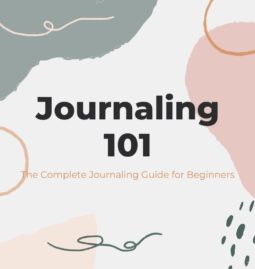A dream journal can unlock the power of your subconscious.
A bold statement, we know. But how many times have you remembered that you had a dream, but can’t remember what it was about?
Or what about all of those times you woke up from a vivid dream, clearly recalling the details of what happened, only to lose your memory of what happened shortly after…never to remember again.
Dreams are powerful, and they can hold the key to our subconscious. The more aware we are of what our mind manifests through our dreams, the more we are able to tap into our own self-awareness and soul clarity.
A dream journal can help you do that.
Here’s what we’ll cover on dream journals:
- What is a dream journal
- Dream Journal vs Dream Diary
- Benefits of a dream journal
- How to start a dream journal
- Dream journal tips
What is a dream journal?
A dream journal (or dream diary) is a record of nightly and reoccurring dream experiences, which is used to keep track of and analyze the psyche, memory, and themes of the dreamer.
With a dream journal, you can record the date, time, and details of your dreams, to help you track patterns, notes, or realizations into your mental, emotional, and spiritual state.
Dream Journal vs Dream Diary
You might hear the terms dream journal and dream diary used interchangeably, and wonder if there’s a difference.
There isn’t.
Much like a journal and a diary are used interchangeably, it’s the same concept when it comes to a dream journal. Both a dream journal and a dream diary are used to specifically record details of your dreams.
Personally, I prefer to use the term journal, but you ‘re entitled to call it whatever name feels right for you.
I’ve always kept a journal for my own self-development and expression, but when I share that with people (mostly men) they joke about it being a diary, which generally has more childish connotations than the word “journal.”
Related: Benefits of Journaling
A diary is often used to record the day’s events, whereas a journal is more versatile, and can include writing prompts, freeflow writing, as well as descriptions of events.
Why start a dream journal?
Keeping track of your dreams is beneficial, not only for personal record keeping, but because it brings with it a variety of benefits to help you understand yourself better, and shift your way of thinking.
Even if you’re not open to writing in a dream journal to explore your subconscious, it can be helpful to track dreams on a surface level as well.
Starting a dream journal will benefit you best when you are open and invested to its benefits.
Dream journals benefit everyone in different ways, depending on what their goal for starting a dream journal is.
Let’s say you want to record your dreams simply to avoid the frustration at not being able to recall the events of your dream a day after you dreamt them. That’s totally fine, too!
Here are the top benefits of keeping a dream journal:
#1 – Dream Recall
This is an obvious benefit for anyone, no matter how far on the woo-woo spectrum you are.
By jotting the details of your dream experience down, you’ll find that it’s easier to remember your dreams in the future.
And, by having a record, you’ll have a tangible source of information to review anytime you feel the need to remember an impactful dream.
#2 – Creativity
We’ve all experienced at least one crazy dream that left us in serious awe of our subconscious’ ability to string together such an engaging plot.
“It came to me in a dream.”
There are plenty of writers, artists, and creatives, that, when asked where they drew inspiration for their work, they give credit to a dream. Take instances like Mary Shelley, Edgar Allan Poe, and Stephen King.
Dreams can unlock a level of subconscious creativity, entering a threshold our conscious self would have never even dared to imagine.
The creative expression of uninhibited dreams can fuel us with inspiration, or supply us with a muse that drives us to create an extension of our dream or nightmare, even if only a seed was planted to begin with.
#3 – Self-Awareness
By recording your dreams, you’re engaging in a level of activity that promotes your own self-awareness because you’re thinking critically about your thought processes and internal stimuli.
Being cognizant of your dreams will help you realize the patterns, feelings, and themes that contribute to your mental and emotional activity.
Increasing awareness to the self brings a heap of influence to your daily life that goes beyond your dreams.
Through intentional observation, and engaging with your deeper self, you’ll soon find that you are creating habits that promote a level of understanding with who you are, what triggers you, and why you are the way you are in waking life.
#4 – Problem Solving
Studies have found that dreams can influence your decisions and choices. If you have a dream that highly impacts you and is difficult to just shake off, then it being front-of-mind for you can affect your attitude about the related person, place, or thing.
A dream might also help you find a solution to something that been’s bringing you pain or confusion.
Through dreams, we can have vivid experiences that allow us to feel as if we are in a situation that we actually haven’t lived in our waking life.
It’s like stepping into someone else’s shoes, and gaining direct insight, helping us to imagine what something is like, and ultimately, arrive at a solution to a problem we hadn’t been able to solve before.
The impact and influence on our ability to deal with problems by gaining direct insight from our dreams, is incredible.
#5 – Warnings
Dreams can serve as powerful warnings to us.
Through dreams, our subconscious fears and/or desires can manifest dream experiences that warn us about the future – directly or indirectly.
It might not always be literal – in fact, dream warnings are rarely literal. So, it’s important to be mindful that what happened in a dream isn’t always going to directly translate to real life.
I recently dreamed of flying in a plane, and thinking the plane was going to crash as we experienced heavy turbulence high in the air. I remember my thoughts preparing me for death, and the regret I felt that my life was ending, and there was so much more I had to do.
When I awoke, I felt like it was a warning that if I don’t take action on my goals now, my life will pass me by, and it’ll be too late to do the things I’ve always wanted to do.
How to start a dream journal
A dream journal is personal, and there isn’t a right or wrong way to go about it.
However, it might be helpful to follow a loose structure if you’re having trouble getting started, or developing a habit.
#1 – Choose how to record
You should record your dreams in a single place – whether that be a file on your computer, a notebook dedicated specifically to recording dreams, or another device.
When I first started recording my dreams, I made the mistake of writing them down in whatever notebook was near me at the time. Sometimes it was a physical notebook or scrap of paper, other times it was a digital note in my phone, or a file on my laptop. This made it difficult to keep track of my dreams, and it was hard to go back and review my dreams because I always forgot where I wrote it down. Lesson learned!
So, choose your medium and stick to it. It doesn’t matter if it’s digital or paper – there are perks to both, and really you should choose whichever one is more natural and convenient for you.
#2 – Consider the placement
Keep your dream journal accessible for when you wake up, and place it somewhere that’s easy to remember.
I now write my dreams in a single notebook that stays on my bedside table.
Have your notebook easily accessible for you when you wake up up, like on your nightstand or underneath your bed.
#3 – Write down your dream ASAP
The details of your dream are freshest when you wake up. Apparently, the best time to recall your dream is about 90 seconds after waking.
This is why having your journal accessible immediately after waking is crucial to the success of dream journaling.
Now that I keep a journal regularly, I’m a lot better about remembering to jot my dream down as I snap awake.
Practice makes perfect, and you’ll find that the more often you practice sticking to your dream journal, the more automatic it’ll become.
#4 – Record the date
Just like with a diary, you should record the date of each dream in your journal.
The date can be just as significant as the details when it comes to dreams, especially after you start to analyze your subconscious.
Knowing exactly what day it was, and what events may have been happening to affect your emotional and mental state of mind will give you a powerful insight that allows you to find patterns and connect the dots more fluidly.
#5 – Freewrite the events
Start recording your dream by freewriting about the events, starting in sequence or order (if there was any kind of order.)
Ask yourself what happened in your dream.
Start as best as you can with the beginning, middle, and end. Jot down the major events and describe what happened in your dream.
#6 – Focus on the details
Once you have the basic events of your dream recorded, it’s time to hoone in on the details and descriptions.
Look beyond the events and shift your focus to the details, like vivid colors or descriptions that stand out, who was in your dream, what emotions you felt, what thoughts you had.
If you don’t recall any specific details, don’t feel pressured! Sometimes I have such intricate dreams that I remember exactly what thoughts I had in the dream, whereas other times I only recall what happened.
#7 – Revisit your dream
Once your dream is written, you can re-read what you wrote on the spot to make sure you have written everything down.
But, you should also revisit your dream a couple days or weeks after the dream.
Sometimes, we gain more insight and understanding of our dream after we have spent some time not thinking about it. Things can just seem to click into place.
#8 – Analyze your dream
In the same notebook or file that you use to record your dream, make a space for your dream analysis.
It doesn’t have to be large area for an in-depth analsysis, unless you want. It can be a small box or a note off into the margins that explains what your dream might have meant.
You can look up a dream analysis by googling your dream, or doing your own research.
Sometimes research isn’t even needed. You might already know the answer to what your dream meant immediately.
For example, if you have a dream about an upcoming work presentation, you might already know that you probably had that dream because you’ve been stressing about the presentation in your waking life.
You don’t always have to dig deep to find meaning in your dream, but sometimes you might need some external help to make sense of your experience.
Dream Journal Tips
Keeping a dream journal or dream diary doesn’t have to be complicated. Find a method of recording that works for you, and stick to it.
If you miss a dream, don’t beat yourself up about it. You’ll have plenty more.
For best practice, follow these journal tips to help you get started on your insightful adventure of dream journaling.
- Write as soon as you wake up from the dream.
- Keep your dream journal next to your bedside.
- Don’t feel pressured to make sense of the dream right after the fact.
- Browse through your dream journal every few months or so.
- Focus on how the dream made you feel, before and after.
- Pay attention to colors.
- Question your dreams.
- Note any repetitive details, or common patterns.
- Look for clues.
- Don’t over-analyze. Sometimes a dream is just a dream.
I hope this helped you find a solid start on keeping a dream journal, and hopefully it showed you just how beneficial it can be for your waking life.
Here’s to you, and your powerful dreams!


